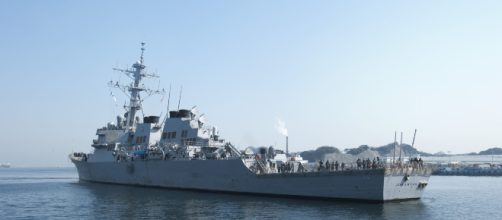After two fatal collisions that occurred over the summer, the US Navy has announced that it has fired two more top officers siting a loss of confidence in their ability to command, Fox News reported.
In June this year, the US Navy destroyer USS Fitzgerald, collided with a cargo ship in the Sea Of Japan which led to the deaths of 7 sailors. Two months later in August, USS McCain suffered a similar fate when it collided with an oil tanker off the coast of Singapore claiming the lives of 10 more sailors.
In a press release, the Navy said that Rear Admiral Charles William and Captain Jeffrey Bennet had been relieved of their duties, with immediate effect.
Press Release
Although the press release did not mention the collisions, the two fired officers were in the chain of command of the USS Fitzgerald's and McCain's respectively, when the collision's occurred.
Vice Admiral Phillip Sawyer, who relieved the two of their duties, appointed Rear Admiral Marc Dalton, who is the commander of Task Force 70, and Captain Jonathan Duffy, Deputy commander of DESRON15 to take their places.
Immediately after McCain's collision, Vice Admiral Joseph Aucoin who was a 3-star Admiral and commander of the 7th Fleet, was fired despite the fact that he was due to retire this month. His place was taken over by Rear Admiral Phil Sawyer.
Senate committee
On Tuesday, Chief of Naval operations Admiral John Richardson accompanied by Navy Secretary Richard Spencer will testify before the Senate Armed Services Committee, to shed more light on the two collisions.
Also expected to appear before the committee, will be the Director of the Defense Force Structure and Readiness issues at the Government Accountability Office, John Pendleton. The office of Pendleton has written a report that highlighted the Navy's readiness shortcomings.
A string of accidents
Apart from Fitzgerald and McCain, a guided missile carrier also collided with a fishing boat in May, off the sea of Japan. There were no casualties reported.
In February, another guided missile carrier, USS Antietam, went into shallow waters off the sea of Japan and damaged its propellers and spilled oil into the sea.
In part, the Government Accountability Office report blamed the Navy for the accidents owing to the fact that it had increased deployment periods, shortened the training duration and deferred maintenance of the vessels.
This was done to meet the high operational demands, which put pressure on a fleet that had already been stretched to the limit.


